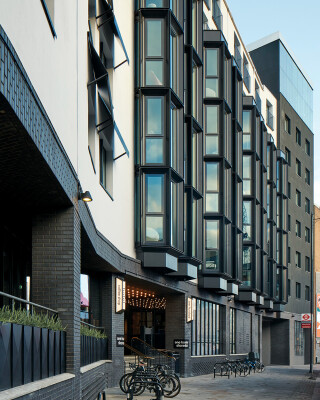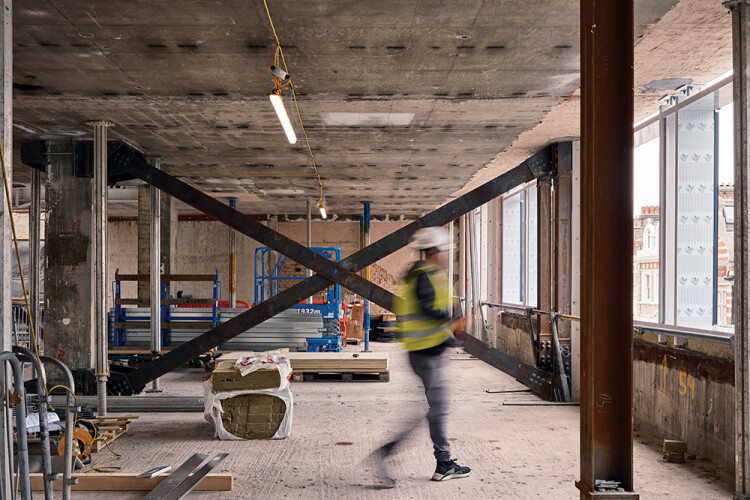In May 2019 property developer E&A took delivery of its latest project, the restored and extended Axtell House in London’s West End.
A prestige project just off Regent Street, the six-storey, 16,340 sq ft Axtell House was a feather in E&A’s cap: a high quality redevelopment built to BREEAM ‘very good’ standard and delivered on time and within budget.
It’s the sort of project you expect from a main contractor with a strong track record in delivering high quality commercial buildings. And yet the contractor responsible for Axtell House had only been trading for three-and-a-half years and had never tackled anything like this before.
That contractor was Red Construction, headquartered in Bedfordshire. And since Axtell House, it has undertaken several more commercial and high-end residential projects of comparable size and complexity in the London area.
In January the company announced its financial results for the year to 31st March 2022. Turnover was £64.78m, up 164% from £24.58m the previous year. Pre-tax profit grew in line with turnover, from £577,000 in 2021 to £1.46m, maintaining a 2.3% margin.

Red Construction’s success at Axtell House and its rapid growth since then is not so difficult to understand when you appreciate the background of its founders. Chief executive Graham Sturge and construction director Ian Hopkinson both have strong track records in the capital’s commercial, leisure and residential markets.
Significantly, the majority of Red’s employees – and even its subcontractors and suppliers – are also steeped in these industry sectors.
Around the turn of the millennium both Sturge and Hopkinson worked together at the London office of Irish contractor John Sisk. The commercial property market was booming and UK construction was fired up by new ideas such as value engineering, partnering, open-book accounting and an end to the old adversarial way of managing the supply chain.
Anybody who was anybody in the industry was either ‘rethinking construction’ or ‘constructing excellence’. Construction in the 21st century was all about teamwork and transparency.
Sisk, in particular, was a good place to work, says Sturge. “It was a very family-oriented business; it had a great atmosphere,” he recalls. But that ethos began to change as management of the business passed to the fifth generation of the family and senior executives were brought in from outside. “It lost that family feel,” says Sturge.

Things changed even more radically in 2008 with the global economic crash when economic hardship saw contractors and their clients revert to the old habits of squeezing their supply chain and abusing the retentions system. Sturge says that by then he was already looking to move on and was receptive when the head-hunters started calling. “After 13 years with Sisk I left and joined McLaren in their London office,” he says.
McLaren at that time was growing strongly despite the fallout from the worldwide recession and Sturge soon found himself running the London business as managing director. “I took the business from a turnover of £45m to £200m in two and a half years,” he says.
To fuel that level of growth, McLaren needed to recruit talented staff experienced in the London commercial property sector and Sturge knew where to find them.
“I knew a lot of people who were looking to leave Sisk and Ian [Hopkinson] was one of them,” he recalls. “He left Sisk and came to work for me as operations director.” Others soon followed in Hopkinson’s footsteps.
By 2013 the economy was showing signs of recovery and the future looked bright. But for Sturge personally, things were not going so well.
“I found I had some health issues. I had high blood pressure, then my brother was diagnosed with cancer and I had some symptoms too.
“My health’s fine now – but at the time it wasn’t good and I decided I needed to take some time out,” says Sturge.
He left McLaren and essentially became a house-husband, looking after a young family instead of a growing construction business. He had plenty of time to relax, but discovered that “you can only play so much golf”. And he found the parent politics at the school gate harder to accept than the cut and thrust of the boardroom. After three months he realised he needed to go back to work.
“I had a vague idea of running some small developments myself, but in the end I decided to get another job,” says Sturge. He was taken on as an adviser by a local acquaintance, Andrew Laing, to help scale-up his business, a specialist subcontractor called AC Flooring. (AC Flooring is now a £50m-turnover main contractor, AC Plc).
Working as a subcontractor was a new and instructive experience for Sturge. “I got very frustrated working for large main contractors with poor project teams. I was shocked by the lack of talent,” he says.
Sturge began to appreciate more keenly the value of transparency in the supply chain and realised that all the brave talk about ‘constructing the team’ and ‘rethinking construction’ had failed to make an impression on whole swathes of the contracting community.
Having formed close working relationships with numerous suppliers and subcontractors during his career with Sisk and McLaren, Sturge felt that he understood how to assemble an effective supply chain that really did work as a team. “Business is about profit, after all,” he says. “If you don’t make a profit you ultimately fail and that goes for everybody in the supply chain, not just the main contractor.”
Conversations with his former colleague Hopkinson led to a plan: to launch their own business – a main contractor with a transparent structure and a supply chain built on trust and teamwork. In October 2015 Sturge and Hopkinson registered Red Construction and started looking for work.
“Naïvely, as it happens – I thought it would be easy,” confesses Sturge. The people behind the new company might have been seasoned professionals but it was still a new business and it had no money.
“The lack of funding was a problem; it was very difficult to get work without any surety,” he says. The new business needed a backer and a bit of networking found the right one – property developer, investor and entrepreneur Simon Lousada who happened to be a good friend of AC Flooring boss Andrew Laing.
With Lousada providing surety for the business Red Construction could start touting for work. Its first project was a residential conversion project for apartments in Milton Keynes where, curiously, Red Construction took the role of consultant rather than main contractor. “The contractor was actually a local builder who was used to building single houses,” explains Sturge.
Working as a consultant gave Sturge another new perspective on the procurement process.
“It’s not until you’ve had a foot in all camps that you fully appreciate the role others play,” he says.
This project also saw Red Construction take on its first employee – Tony O’Farrell, another former Sisk/McLaren colleague, now the company’s project director.

From that point, Red Construction started to grow steadily. Staff recruitment was a key priority and, as before, Sturge and his fellow directors turned to people they knew. Today around 90% of Red Construction’s staff are ex-colleagues either from Sisk or McLaren. “Having an experienced team gave us confidence and helped us grow in the London market,” says Sturge.
The successful delivery of Axtell House preceded a series of similar projects in and around the capital. “The average contract value now is about £25m and they’re all projects of the type we were used to tackling with Sisk and McLaren,” says Sturge.
In just a few years, Red Construction had established itself as a leading contractor in the London market. Then in September 2021, just a couple of years after handing over Axtell House, the company announced a restructuring, dividing itself into two distinct operating businesses, Red London and Red South West with an office in Bristol.
Setting up a separate division to serve the southwest, Sturge admits, was more opportunistic than strategic. “A couple of recladding jobs came up in Bristol at around the time Ian and I were looking at a hotel job in Exeter from a property investment point of view,” he explains.
In the course of his travels Sturge met Grant Miller, an operations manager with local construction group Midas. “He introduced me to Derek Quinn who had been the executive director for Midas Wessex but had already left Midas,” says Sturge.


“Derek was interested in what we were doing and I suggested that maybe he’d like to help us set up a Bristol office.” By late 2021 Quinn was on board and Red South West was officially launched.
Then in February 2022, about 18 months after Sturge first met Miller, Midas Group fell into administration. Sturge says that Red’s move into the southwest was “just an opportunity that arose” – which is no doubt accurate; but Midas was already making losses before it collapsed leaving unpaid debts of more than £53m. Anybody with some detailed knowledge of Midas’ affairs might have seen that ‘opportunity’ coming.
Despite the creation of Red South West, Sturge insists that Red Construction does not have ambitions to expand geographically. “London is our core market – always will be,” he says. “Most of the jobs we look at outside of the London area go nowhere; but the southwest was worth pursuing. If Grant hadn’t been there, it probably wouldn’t have happened.”
Sturge agrees that the collapse of Midas left a vacuum that Red was able to fill. Midas worked in much the same sectors as Red and its collapse meant that a significant number of skilled and experienced professionals were in the jobs market – and some found a natural home with the newly-established Red South West.
About a year after setting up the Bristol operation, Red Construction launched another separate division – Red Special Projects. Still focusing on the commercial, leisure and residential sectors, the new Special Project teams targets smaller contracts, from about £100,000 up to £7m in value.
The new division (run by construction director Nathan Farrar – another former McLaren colleague) was conceived specifically in response to Red Construction’s rapid growth and its ability to compete with larger contractors, explains Sturge.
“With McLaren it was all about growing the business and chasing bigger projects,” he says. “But that has its own problems. When you have a big project coming to an end, you need to redeploy a large number of people and you usually only need about half of them in the early stages of the next project. That can create problems in terms of overheads.”
If you have a mix of big and small jobs, it is easier to optimise your resources, reckons Sturge.
He explains that there is a tendency among the big main contractors for the best people to gravitate towards the larger projects that are generally more demanding and more prestigious. “So you often find that your smaller jobs are never run by your best people and so you lose out to smaller contractors who are focused on those projects,” he says.
The Special Projects division is Red Construction “going back to its roots,” says Sturge. “It helps us mitigate the peaks and troughs.”
Being a separate part of the business, Special Projects is not tempted to compete for the larger projects undertaken by Red London or Red South West. But it still has access to the company’s wider supply chain and can call upon the additional resource of the group whenever necessary.
A lot has changed in the UK construction industry since Sir John Egan published Rethinking Construction, his vision of a construction industry free of adversarial business practices and supply chain abuses. The industry is safer today and in many ways it’s more efficient, but old habits die hard, says Sturge.
“Some clients are more traditional – even confrontational. We accept that as a business. But we are careful about how we choose our projects,” he says. The company can afford now to be more discerning – and declares that it wants to work “alongside discerning and like-minded clients”.
Last year’s leap in turnover might look like a big jump, says Sturge, but “it’s actually controlled growth”. This year, the company expects turnover to top £70m and Sturge hopes to turn over between £75m and £100m next year. “In five years I’d like to be turning over £200m; up to £140m in London and maybe £30m - £35m in the southwest,” he says.
Red’s core sectors will remain the same: high-end residential, commercial and leisure. Sturge does not see any likelihood of diversifying from this familiar territory, although he keeps an eye on the student accommodation market – “but at the moment, costs are too high in that sector to make a decent return,” he says.
Similarly schools and healthcare: “We don’t work in those sectors. We have no track record there and no established supply chain. At the moment we couldn’t compete.”
Geographically, though, there’s always a possibility. “If we see another opportunity we will look at it. In the southwest it worked because we picked up the Midas supply chain. But to make a move to other areas of the country we’d have to tick a lot of boxes.”
London calling
In the six years since it was formed, Red Construction has made a name for itself on the London commercial building market.
Axtell House, completed in 2019, has been followed by several more high-spec commercial schemes, as well as hotel refurbishments and residential developments.
Last summer, the company completed Townsend House, a £20m six-storey mixed-use development in Westminster for client ITC Properties.
The building, designed by architect Squire & Partners, features a curved façade with bronze and sandstone detailing intended to complement the surrounding art-deco buildings.
In December 2021 Red Construction completed the refurbishment of an office building at Greville Street/Bleeding Heart Yard in Farringdon, just west of the City of London.
Like Axtell House, this £11.4m project for Seaforth Land, made use of lightweight cross-laminated timber (CLT) to add two new floors to the existing building.
Further east, in Shoreditch, Red has carried out the complete refurbishment of a hotel – One Hundred Shoreditch – for the Lore Group.
Completed in March 2022, this £14.5m project comprises 258 bedrooms, six new restaurants and bars and complete replacement of the mechanical & electrical system including hybrid variable flow heat recovery units.
The company is currently working on another prestigious commercial project at 80 New Bond Street for developer Hines(main picture).
This project involves the part-demolition and removal of the existing top floor and Dering Street wing, the latter to be reconstructed with two floors on top of the building, taking it to seven storeys.
The project is designed to achieve a BREEAM Outstanding rating with a BIM Level 2.
All internal steelwork is being renovated and a new pre-cast concrete lift core will be added. The building will be re-clad with glass-reinforced concrete façade panels and pre-cast feature columns will be added between the ground floor and first floor.
Axtell House
Red Construction’s first ‘proper’ contract, the refurbishment and extension of Axtell House, provided the blueprint for the company’s subsequent projects.
The project entailed demolishing the top two existing storeys and adding three new storeys to provide premium commercial space. It was a demanding contract in many respects: a sensitive location with restricted access and there was an existing tenant occupying the ground floor and basement throughout.
“It was our first opportunity to demonstrate our culture,” says Red Construction CEO Graham Sturge. “It set an example of how we wanted to operate.”
Red won the enabling works package and then tendered for the main contract via a two-stage competitive tender process. “The whole thing was open and transparent,” says Sturge, who negotiated the contract directly with Albany Foot, managing director of the client, E&A.
Sturge was also in regular contact with E&A’s owners, brothers John and Stephen Rosefield, throughout the project.
When the ambitious extension design by architects Darling Associates looked likely to increase loadings on the existing structure, Red’s consulting engineer, Fluid Structures, proposed using cross-laminated timber (CLT) for the new floor slabs.
There are relatively few specialists in the UK capable of installing CLT structures and Red faced a serious dilemma when its specialist sub-contractor pulled out of the project at the last minute. “We literally had 48 hours before we had to press the ‘go’ button,” says Sturge.
“With the sub-contractor pulling out of the project we had to complete the design, procurement and then install the CLT ourselves,” he explains. “We are now the only main contractor – as of last year – that has a direct supply agreement with [the German CLT supplier] Binderholz.”
Explaining the situation to John Rosefield, Sturge requested a £15,000 contingency to cover unforeseen costs – correctly, as it turned out: “We excessively over-ordered glue,” he admits. The extra cost did not consume the entire reserve pot, but Rosefield refused to accept the £8,000 left after completion.
And for Sturge, that illustrates the kind of relationship that Red Construction wants to build with its entire supply chain.
Got a story? Email news@theconstructionindex.co.uk





